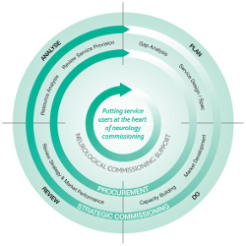A commissioning support agency set up by the MND Association, MS Society and Parkinson’s UK is set to reap the benefits of the new commissioning landscape outlined in the Health and Social Care Bill.
The three charities set up Neurological Commissioning Support (NCS) in 2007 to test whether it could effectively provide commissioning support to the NHS. Three years on, it is providing paid consultancy to primary care trusts in Gloucestershire, Surrey, and Cornwall and the Isles of Scilly, has been deemed by an independent evaluation to be highly effective, and is now planning to register as a limited company.
Sue Thomas, chief executive of the NCS, told Civil Society that the PCTs hired NCS to make recommendations about how neurological services could best be delivered locally from a service-user perspective.
“We do external consultation with patients, a Joint Strategic Needs Assessment with the public health department, and carry out gap analyses. We look at what is working and what isn’t, and how much it is costing. Then we make recommendations for redesigning the services that the PCTs will be commissioning, using a shared decision-making process with service-users.”
The three charities do not provide services to patients, so there is no conflict of interest.
Thomas said the recommendations range widely – in one case NCS identified that local GPs were sending patients to see neurologists when some of the issues could have been dealt with at a primary care level, so the agency arranged training for them. In another, NCS recommended that district nurses be allowed to give steroid therapy at home rather than making patients travel to hospital.
Thomas said NCS redesigns of service provision had generally resulted in significant cost-savings to the NHS as well as high levels of user satisfaction.
Staff from all three charities contribute time to NCS as required. It is currently constituted as a partnership but intends to become incorporated as a limited company this month.
Significant interest from other charities
Thomas was not aware of any similar agency set up by charities but said there had recently been significant interest in the model from other health groups, notably the Mental Health Providers Forum and the gastro charities.
“Andrew Lansley (Health Secretary) seems to like us,” she said. “He keeps using us an example of what the sector could be providing in terms of commissioning support.”
She said the new Health and Social Care Bill, which hands responsibility for commissioning local health services to GP consortia, was expected to be good for business. “GPs are seriously going to need helping commissioning neurological services so it is probably going to be a boost to us in terms of selling our services.”
Thomas refused to be drawn on criticism from opponents to the Bill that it paves the way for privatisation of the NHS. She said: “Our job is to concentrate on the nitty-gritty, trying to get services right for people living with long-term neurological conditions.
“Obviously we want services to be provided by the best possible means and that might include bringing in the private sector. But our priority is improving services to get the best possible outcomes for service-users.”
Thomas said NCS’ biggest benefit is its national overview, which gives it insight into lots of different ways of providing services. Thomas added. “It really helps in localities where there is a bit of a silo mentality. We have a really broad picture of how services might be able to be delivered.”
Lansley: Real opportunity for sector
During a meeting with healthcare professionals from the specialist MND Care Centre last week, Andrew Lansley said: “I’m not looking for individual GPs to be commissioning services for these kind of complex, neurological conditions. Rather I’m expecting GP consortia on a much bigger scale or for more to come together in a broader network to commission services.
“There is also an opportunity for some of the voluntary sector to put themselves forward, like the MND Association, MS Society and Parkinson’s UK have done to form a commission support organisation. I think that presents a real opportunity for us.”









